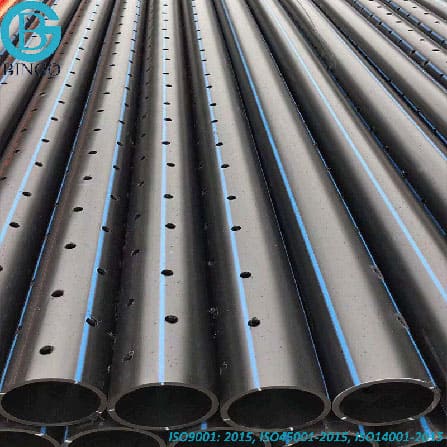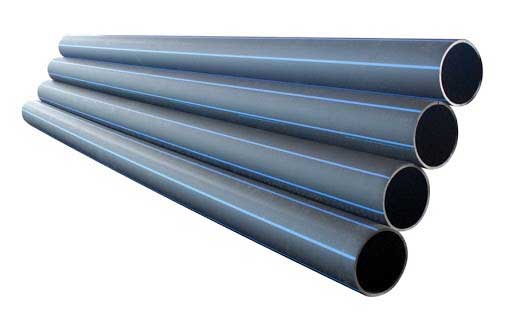Why Texas hdpe pipe manufacturer Is Dominating in Advanced Pipe Solutions
Wiki Article
A Comprehensive Overview to the Various Usages of HDPE Pipeline in Building and Industry
HDPE pipelines have become a crucial element in modern-day construction and commercial applications. Their unique buildings, such as resistance to rust and light-weight layout, make them appropriate for a vast array of uses. From water systems to agricultural irrigation, HDPE pipes use remedies that enhance efficiency and sustainability. Comprehending their varied applications is essential for experts wanting to enhance framework. What specific advantages do these pipes give each market?Water Supply and Distribution Systems
Supply of water and circulation systems are important parts of city framework, often counting on high-density polyethylene (HDPE) pipes for their sturdiness and efficiency. These systems transport potable water from therapy centers to customers, making sure availability and security. HDPE pipes are preferred for their resistance to corrosion, chemicals, and severe temperature levels, which improves their durability and reduces upkeep prices. Furthermore, their light-weight nature allows for simpler installation and transport, making them ideal for numerous city and rural applications.The flexibility of HDPE pipelines enables them to be installed in limited spaces and around obstacles, decreasing the requirement for substantial excavation (American Plastics HDPE Pipe for Oilfield). Furthermore, their smooth indoor surface area decreases rubbing losses, boosting water circulation rates. As cities remain to grow, the need for dependable water supply systems raises, positioning HDPE pipes as a lasting solution for contemporary framework projects. Their proven track document makes them a recommended option amongst designers and urban coordinators alike
Wastewater Monitoring and Therapy
Effective wastewater monitoring and therapy are vital for keeping public health and environmental high quality. HDPE pipelines play a vital function in this procedure due to their longevity, resistance to corrosion, and ability to endure harsh chemicals. These pipes are typically utilized in various applications, including sewer system, stormwater drain, and wastewater therapy centers. Their light-weight nature promotes easier installation and transportation, reducing labor costs and time.Additionally, HDPE pipelines have a smooth indoor surface that decreases friction loss, promoting efficient circulation rates. They are likewise less susceptible to leakages and failures contrasted to conventional products, guaranteeing that impurities are included effectively. In addition, their flexibility permits for adaptability in different dirt problems, making them suitable for diverse ecological settings. As industries progressively focus on sustainable methods, using HDPE pipelines in wastewater monitoring systems aligns with objectives for lowering environmental effect and improving source recuperation.
Agricultural Irrigation Solutions
In agricultural setups, efficient irrigation remedies are vital for maximizing crop yields and handling water sources. HDPE (High-Density Polyethylene) pipes play a vital function in contemporary watering systems as a result of their durability, flexibility, and resistance to rust. Their capability to stand up to high stress makes them suitable for both surface area and subsurface watering applications, making certain consistent water circulation throughout areas.Farmers can make use of HDPE pipelines in drip watering systems, which deliver water directly to plant roots, reducing wastage and promoting healthy and balanced development. In addition, these pipelines are light-weight and simple to set up, minimizing labor prices and installment time. Their long life expectancy and low maintenance requirements better enhance their appeal in farming techniques.
HDPE pipes are environmentally pleasant, as they can be anonymous reused and do not leach dangerous chemicals right into the dirt. This makes them a sustainable selection for farmers intending to take on environmentally friendly farming techniques while maximizing performance.
Industrial Applications and Procedures
Flexibility is a characteristic of HDPE pipelines, making them vital in various commercial applications and processes. These pipelines are extensively used in chemical processing markets due to their exceptional resistance to a variety of destructive substances. HDPE's light-weight nature, combined with high tensile toughness, enables for very easy installation and lasting performance in demanding settings.In the oil and gas industry, HDPE pipelines play an important duty in carrying hydrocarbons and gases, many thanks to their resilience and adaptability - Pipe Manufacturing Midland TX. Additionally, they are utilized in mining procedures for the transport of slurry and other materials, where standard piping systems might fail
HDPE pipelines are increasingly made use of in making centers for water supply lines and wastewater monitoring. Their capability to hold up against severe temperature levels and pressures makes them sewer line liner suitable for a variety of industrial processes. Overall, HDPE pipes contribute substantially to performance and safety and security throughout varied industrial applications.
Stormwater Administration and Drainage Systems
Stormwater management and water drainage systems are critical parts in metropolitan facilities, developed to handle excess rainfall and lower flooding threats. High-density polyethylene (HDPE) pipelines are progressively utilized in these systems due to their toughness, versatility, and resistance to rust. These pipes successfully deliver stormwater away from populated locations, lessening surface overflow and avoiding waterlogging.HDPE's lightweight nature promotes much easier installation, reducing labor expenses and construction time. In addition, its resistance to chemicals and environmental stressors assurances durability and dependability in numerous climates. In addition to typical drain applications, HDPE pipelines are likewise used in cutting-edge options such as green framework, which includes rainfall gardens and permeable sidewalks.

Often Asked Inquiries
Exactly How Does HDPE Pipeline Compare to PVC Pipeline in Cost?
Generally, HDPE pipe has a tendency to be more pricey than PVC pipe because of its enhanced longevity and versatility. Lasting cost factors to consider, such as maintenance and life expectancy, might prefer HDPE in details applications.What Is the Lifespan of HDPE Pipeline Under Diverse Problems?
HDPE pipelines generally have a life expectancy of 50 to 100 years, depending on environmental conditions, setup methods, and usage. Aspects such as temperature level, dirt kind, and direct exposure to chemicals can greatly influence their longevity.Can HDPE Pipes Be Recycled After Use?
Yes, HDPE pipes can be reused after usage. The recycling procedure involves thawing down the product, permitting it to be repurposed right into brand-new items, consequently advertising sustainability and minimizing environmental effect associated with plastic waste.Are There Any Details Installment Obstacles With HDPE Pipelines?
Installment obstacles with HDPE pipes include appropriate jointing techniques, ensuring adequate trench problems, and handling thermal expansion. Additionally, skilled labor is required to take care of specific devices, which can complicate the installment process in various settings.
What Certifications Should I Look for When Buying HDPE Pipelines?
When purchasing HDPE pipelines, one need to seek qualifications such as ASTM, AASHTO, and ISO, which verify high quality and compliance with industry standards, assuring longevity and efficiency in different applications. - hdpe pipe in directory stock Midland TXReport this wiki page